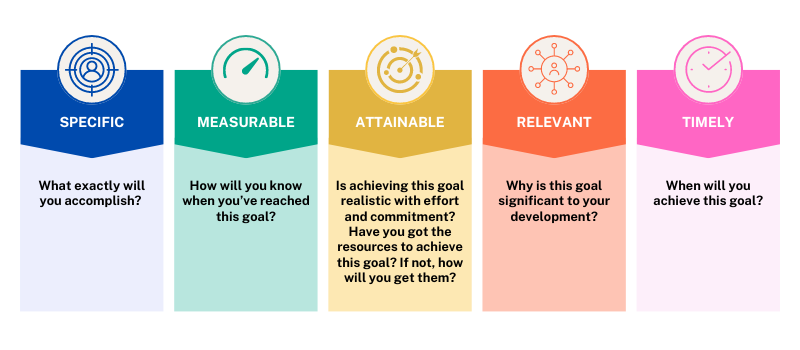To begin your goal-setting journey, think about where you want to be in the future. Don’t let this be overwhelming – this could be next week, next semester, next year, or in a few years, it is up to you!
This main aim (or aims) can then help inform your goals and can help add in the details, what resources might be needed, etc.
Click here to view some example questions to get started:
- What do you expect to achieve from your course? Is there particular subject knowledge you would like to develop or academic skill you want to obtain?
- Do you have personal development aims? Examples here might be “I would like to run 10km” or “I would like to be more assertive.”
- Do you have a specific career in mind? Do you want to be a chemistry teacher or would you like to run your own business?
- Are there any university or wider social issues you are passionate about and would like to get more involved with? Do you really care about education, and would like to volunteer to work with young people?
- Where do you see yourself in five years’ time? An example here could cover “I would like to live abroad.”
- Are there any attributes you would like to develop? E.g. would you like to develop critical thinking, problem-solving or creative skills?
Considering your answers to the questions and statements above, choose three medium or long-term aims e.g. I want to set up my own business when I graduate. Then break these down into some manageable short-term goals, which are the things you might need to do to achieve your long-term aims.
Next, break down your short-term goals into objectives achievable in the next few weeks/semester/year. It is your journey so decide what is realistic for you – it should be exciting not terrifying! Ask for help if you struggle with this process e.g. ask your personal tutor or a career advisor.
Use the SMART guide below to make sure your goals are as helpful as they can be to aid your planning:

You can find more information here.
Goal Setting Example
| Long-Term Aim | Goals | SMART objectives |
| 1. Run my own business | a) Complete my degree with a 2.1 outcome | Book onto an Academic Skills workshop to improve my response to feedback and my critical thinking skills [by the end of this semester]. |
| b) Set up a side hustle | Sell the items I no longer need on sites such as Vinted – practise running a business but on a smaller scale to improve my financial literacy skills [reflect on how this is going each month]. | |
| c) Improve my digital skills | Complete the digital accreditations with Rise and LinkedIn learning – earning digital badges and points too [by the end of the academic year]. |
Sometimes, it can help to see information in one place and one way of doing this is via mind-mapping. This technique simply requires you to draw up your goal and then add in the details of how to reach it, what resources you might need etc, all on one diagram.
This link gives you some tips on how to create a mind map of your goals:
There are also some amazing apps and software on the market – or you can get started with a pen and some sticky notes. How you do this is up to you!
Faculty Specific Examples
Here are some examples of goals related to a department/area in each of the four faculties:
Click ‘Mark Complete’ below before continuing.






